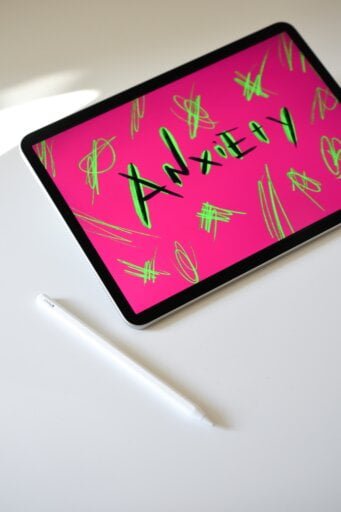Have you ever felt trapped in a never-ending cycle of worry and fear, believing every worst-case scenario your mind conjures up? It’s time to challenge those anxious thoughts, because your anxiety is lying to you. In this article, we will explore the deceptive tactics of anxiety and empower you with the knowledge and tools to combat its distortions. Take control of your mind, and let’s expose the truth behind your anxiety.
Understanding Anxiety
Anxiety is a common emotion that everyone experiences from time to time. It is a state of unease or worry that can manifest in different ways. Anxiety can vary in intensity and duration, and it can be caused by various factors. Understanding anxiety is crucial in order to effectively manage and overcome it.
Definition of Anxiety
Anxiety can be defined as a feeling of fear, apprehension, or worry. It is a normal response to stress or a perceived threat. Anxiety can range from mild to severe and can have physical, emotional, and cognitive symptoms. While occasional anxiety is a natural part of life, if it becomes frequent and interferes with daily functioning, it may indicate an anxiety disorder.
Anxiety Disorders
Anxiety disorders are mental health conditions characterized by excessive and persistent worry or fear. These disorders can significantly impact a person’s life, causing distress and impairment in various areas, such as work, school, and relationships.
Common types of anxiety disorders include generalized anxiety disorder (GAD), panic disorder, social anxiety disorder, and phobias. Each disorder has its own set of symptoms and criteria for diagnosis, but they all involve excessive anxiety and fear.
Causes of Anxiety
Anxiety can be caused by a combination of genetic, environmental, and personality factors. It may be triggered by specific situations or events, such as public speaking or job interviews. Chronic stress, trauma, and a history of physical or emotional abuse can also contribute to the development of anxiety.
Biologically, anxiety is linked to an imbalance of neurotransmitters in the brain, such as serotonin and gamma-aminobutyric acid (GABA). These neurotransmitters play a role in regulating mood and emotions. Imbalances or deficiencies in these chemicals can lead to heightened anxiety.
Types of Anxiety Lies
Anxiety often produces irrational thoughts and beliefs that are not based on reality. These anxiety “lies” can distort our perception of ourselves, others, and the world around us. It is important to recognize and challenge these lies in order to break free from their grip.
Catastrophizing
Catastrophizing is a common anxiety lie where you imagine the worst possible outcome in a given situation. Your mind exaggerates the negative consequences and overestimates the likelihood of them happening. Catastrophizing can intensify feelings of anxiety and make it difficult to think rationally.
Mind Reading
Mind reading is another anxiety lie where you assume you know what others are thinking or feeling, usually in a negative way. You may believe that people are judging or criticizing you, even if there is no evidence to support this belief. Mind reading can lead to social anxiety and a constant need for validation from others.
Fortune Telling
Fortune telling involves predicting negative outcomes or failures in the future without any concrete evidence. You convince yourself that things will go wrong, despite having no proof to support this belief. Fortune telling can limit your potential and prevent you from taking risks or pursuing your goals.

Unmasking Anxiety Lies
Recognizing and challenging anxiety lies is a crucial step in managing anxiety effectively. By questioning our thoughts and seeking evidence, we can gain clarity and regain control of our minds.
Recognizing Anxiety Lies
The first step in unmasking anxiety lies is to become aware of them. Pay attention to your thoughts and notice when they become irrational or distorted. Keep a journal to record these thoughts and identify patterns. Recognizing anxiety lies is the first step towards challenging them.
Questioning the Thoughts
Once you have identified anxiety lies, it is important to question their validity. Ask yourself if there is any evidence to support these thoughts. Are they based on facts or are they skewed by anxiety? Often, you will find that these thoughts are not grounded in reality and are simply products of anxious thinking.
Seeking Evidence
To further challenge anxiety lies, seek evidence that contradicts them. Look for examples from your own life where things have turned out well or where your fears were unfounded. Talk to supportive friends or family members who can provide a different perspective. Gathering evidence against anxiety lies can help weaken their hold on your mind.
Breaking the Pattern
Managing and overcoming anxiety requires breaking the pattern of anxious thinking. Several strategies and techniques can help reshape your thoughts and promote a more positive and realistic mindset.
Cognitive Behavioral Therapy
Cognitive Behavioral Therapy (CBT) is a highly effective treatment for anxiety disorders. It focuses on identifying and changing negative thought patterns that contribute to anxiety. With the help of a therapist, you can learn to challenge and reframe anxious thoughts, replacing them with more realistic and positive ones.
Mindfulness and Meditation
Mindfulness and meditation practices can help calm the anxious mind and increase self-awareness. By bringing your attention to the present moment and observing your thoughts without judgment, you can reduce anxiety and cultivate a sense of inner peace. Regular practice can also improve your ability to detach from anxious thoughts and let them pass without reacting to them.
Challenge and Reframe
Challenging and reframing anxious thoughts is a powerful way to break the pattern of anxiety lies. When you notice an anxious thought, pause and ask yourself if there is a more realistic and rational alternative. Reframe the thought in a more positive or balanced way. Over time, this practice can help train your brain to think in a healthier and more constructive manner.

Dispelling Common Anxiety Myths
There are many misconceptions surrounding anxiety that can perpetuate stigma and hinder recovery. It is important to dispel these myths and educate ourselves and others about the realities of living with anxiety.
Anxiety is All in Your Head
Anxiety is not simply a result of overthinking or a lack of willpower. It is a real and valid mental health condition that can have a significant impact on a person’s life. Anxiety is not something that can be easily controlled or dismissed by simply “thinking positive.”
Anxiety is Weakness
Anxiety is not a sign of weakness. It is a natural response to stress and can affect anyone, regardless of their strength or resilience. People with anxiety often face daily challenges that require immense courage and determination. Acknowledging and seeking support for anxiety takes strength and self-awareness.
Anxiety Can’t Be Managed
Contrary to popular belief, anxiety can be managed and treated. With the right support and strategies, individuals with anxiety can lead fulfilling and meaningful lives. It may require time, effort, and a combination of different approaches, but recovery is possible.
How Anxiety Lies Impact Daily Life
Anxiety lies can have a profound impact on various aspects of daily life, making it crucial to address them effectively. Understanding the consequences of anxiety lies can motivate individuals to seek help and make positive changes.
Impaired Decision Making
Anxiety lies can cloud judgment and impair decision-making abilities. Fears and worries can dominate your mind, making it difficult to think clearly and make rational choices. This can lead to missed opportunities or poor decision-making, which can further fuel anxiety and hinder personal growth.
Deteriorating Relationships
Anxiety lies often involve negative assumptions about others, leading to strained relationships. When you believe that people are constantly judging or rejecting you, it can create distance and prevent meaningful connections. Over time, this can wear down relationships and isolate you from important support systems.
Negative Self-Perception
Anxiety lies can distort your self-perception, leading to low self-esteem and self-criticism. Constant negative thinking can erode your confidence and prevent you from recognizing your worth and abilities. This negative self-perception can impact all areas of life, from work to personal relationships.

Recognizing Anxiety Triggers
Identifying and understanding your anxiety triggers is essential in managing anxiety effectively. By recognizing what situations or factors contribute to your anxiety, you can develop strategies to cope with or avoid them.
Identifying Personal Triggers
Personal triggers are unique to each individual and can stem from past experiences, traumatic events, or specific fears. Pay attention to situations or thoughts that consistently lead to increased anxiety. Keeping a journal can help you identify patterns and gain insights into your personal triggers.
Environmental Triggers
Environmental triggers are external factors that can contribute to anxiety. These can include crowded or noisy places, certain smells, or specific environments. Take note of which settings or situations tend to increase your anxiety levels, and consider ways to minimize exposure or develop coping mechanisms for these triggers.
Social Triggers
Social triggers relate to interactions with others that elicit feelings of anxiety. This can include social events, public speaking, or being in unfamiliar social settings. Recognizing these triggers can help you prepare and implement strategies to manage social anxiety, such as deep breathing or cognitive reframing techniques.
Ways to Calm Anxiety
When anxiety strikes, there are several techniques that can help calm your mind and body, allowing you to regain control and find a sense of peace.
Deep Breathing
Deep breathing is a simple but effective technique to reduce anxiety and promote relaxation. Take slow, deep breaths, filling your lungs completely and exhaling slowly. Focus on your breath and let go of tension with each exhale. Deep breathing can slow down your heart rate and activate the body’s relaxation response.
Progressive Muscle Relaxation
Progressive Muscle Relaxation (PMR) involves systematically tensing and then relaxing different muscle groups in your body. This technique helps release physical tension and promote relaxation. Start from your toes and work your way up, tensing and then relaxing each muscle group. PMR can be practiced regularly to alleviate anxiety and promote a sense of calm.
Visualization Techniques
Visualization techniques involve creating a mental image of a peaceful and calming place. Close your eyes and imagine yourself in a serene setting, such as a beach or a lush forest. Visualize the details vividly, using all of your senses. This technique can help shift your focus away from anxious thoughts and create a sense of tranquility.
Seeking Professional Help
If anxiety is significantly impacting your daily life and functioning, it may be beneficial to seek professional help. There are various options available that can provide support and guidance in managing anxiety.
Therapy and Counseling
Therapy and counseling can be extremely helpful in treating anxiety disorders. Cognitive Behavioral Therapy (CBT), Exposure Therapy, and other evidence-based approaches can help identify and address the underlying causes of anxiety. A therapist can provide tools and strategies to manage anxiety effectively and promote overall well-being.
Medication Options
In some cases, medication may be prescribed to manage anxiety symptoms. Antidepressants, benzodiazepines, and other medications can help regulate brain chemistry and reduce anxiety. It is important to consult with a healthcare professional to determine the most appropriate medication and to monitor its effectiveness and potential side effects.
Support Groups
Support groups can provide a sense of community and understanding for individuals with anxiety disorders. Connecting with others who have similar experiences can offer validation, support, and coping strategies. Support groups can be in-person or online and provide a safe space to share struggles and successes.
Building Resilience Against Anxiety Lies
Building resilience against anxiety lies involves implementing various self-care practices, maintaining a healthy lifestyle, and developing coping mechanisms.
Self-Care Practices
Self-care is essential in managing anxiety and promoting overall well-being. Engage in activities that bring you joy and relaxation, such as hobbies, exercise, journaling, or spending time in nature. Prioritize self-care and make it a regular part of your routine.
Maintaining Healthy Lifestyle
A healthy lifestyle can support optimal mental health and resilience against anxiety lies. Ensure you are getting enough sleep, eating a balanced diet, and engaging in regular physical activity. Limit alcohol and caffeine intake, as they can exacerbate anxiety symptoms.
Developing Coping Mechanisms
Coping mechanisms are strategies and techniques that help you manage and navigate anxiety. Identify healthy coping mechanisms that work for you, such as practicing mindfulness, engaging in creative outlets, or seeking social support. Develop a toolbox of coping mechanisms and utilize them when anxiety arises.
In conclusion Your Anxiety Is Lying To You
Understanding anxiety, recognizing anxiety lies, and implementing strategies to manage and overcome anxiety are crucial steps in reclaiming your mental well-being. By challenging irrational thoughts, seeking support, and practicing self-care, you can build resilience against anxiety lies and live a fulfilling life. Remember, your anxiety may be lying to you, but with perseverance and the right tools, you can regain control and thrive.
Frequently Asked Questions:
1. How do you know if your anxiety is lying to you?
- Recognizing distorted thoughts, challenging negative beliefs, and seeking a balanced perspective can help unveil the deceptive nature of anxiety.
2. Do hoodies help with anxiety?
- Hoodies can provide comfort and a sense of security for some individuals, but addressing anxiety at its root through coping strategies and support is essential.
3. Can anxiety convince you?
- Anxiety can create convincing but often irrational narratives. Developing mindfulness and critical awareness can help distinguish between anxiety-driven thoughts and reality.
4. How do I know if my anxiety is real?
- Validating anxiety involves acknowledging your feelings without judgment. If anxiety significantly impacts your daily life, seeking professional support can provide clarity.
5. What should I wear if I have anxiety? – Choose comfortable clothing that promotes a sense of security. The focus should be on what makes you feel at ease rather than adhering to specific fashion choices.
6. How do you wear off anxiety?
- Engage in stress-relief activities, practice mindfulness, exercise regularly, and seek social support. Developing healthy coping mechanisms can help wear off anxiety over time.
7. How do you hide anxiety?
- While hiding anxiety is not recommended, practicing relaxation techniques, maintaining a routine, and seeking professional help can manage and reduce visible signs of anxiety.
8. What is false anxiety? – False anxiety refers to exaggerated or unfounded worries that don’t align with actual threats. Identifying and challenging these irrational thoughts is crucial for overcoming false anxiety.
9. Will I ever be anxiety-free? – Achieving complete freedom from anxiety might be unrealistic, but with effective coping strategies, therapy, and support, it’s possible to significantly reduce its impact on your life.
10. Can anxiety turn into fear? – Yes, persistent anxiety can escalate into fear. Understanding the progression and addressing anxiety early can prevent it from evolving into more debilitating fears.
11. Why is my anxiety so bad? – Various factors contribute to heightened anxiety, including genetics, stress, and past experiences. Identifying triggers and seeking professional help can address the root causes.
12. How much anxiety is too much? – When anxiety interferes with daily functioning, relationships, or well-being, it may be considered excessive. Seeking help from a mental health professional is advisable in such cases.
13. Can you have false anxiety? – False anxiety involves unfounded worries that lack a basis in reality. Addressing these irrational thoughts through therapy and coping strategies is crucial.
14. What Color is best for anxiety? – Colors can impact mood differently for each person. While there’s no universal color for anxiety, soothing tones like blues and greens are often associated with calmness.
15. What is the 3 trick for anxiety? – The 3-3-3 technique involves naming three things you see, hear, and feel to ground yourself in the present moment, helping alleviate anxiety.
16. Can you ever fully get rid of anxiety? – Complete elimination of anxiety may not be feasible, but learning to manage and cope with it effectively can significantly improve overall well-being.
17. How long will anxiety go away? – The duration of anxiety relief varies. Consistent use of coping strategies, therapy, and lifestyle changes can contribute to more prolonged periods of relief.
18. How to sleep with anxiety? – Establish a relaxing bedtime routine, create a comfortable sleep environment, and practice relaxation techniques to promote better sleep despite anxiety.
19. Why can’t I talk when I’m anxious? – Anxiety can impact verbal expression. Practicing deep breathing, self-compassion, and seeking support can help overcome communication challenges during anxious moments.
20. Can people with anxiety hide it? – While individuals may attempt to hide anxiety, it’s crucial to address the root causes rather than conceal the emotions. Seeking support can be a transformative step.
21. Why do people fake anxiety? – Some individuals may fake anxiety for various reasons, including seeking attention or coping with challenges. It’s essential to encourage open conversations and understanding.
22. What is pure anxiety? – Pure anxiety refers to the emotional and physical sensations experienced without a specific cause or trigger. It highlights the internal nature of anxiety, often unrelated to external stimuli.
